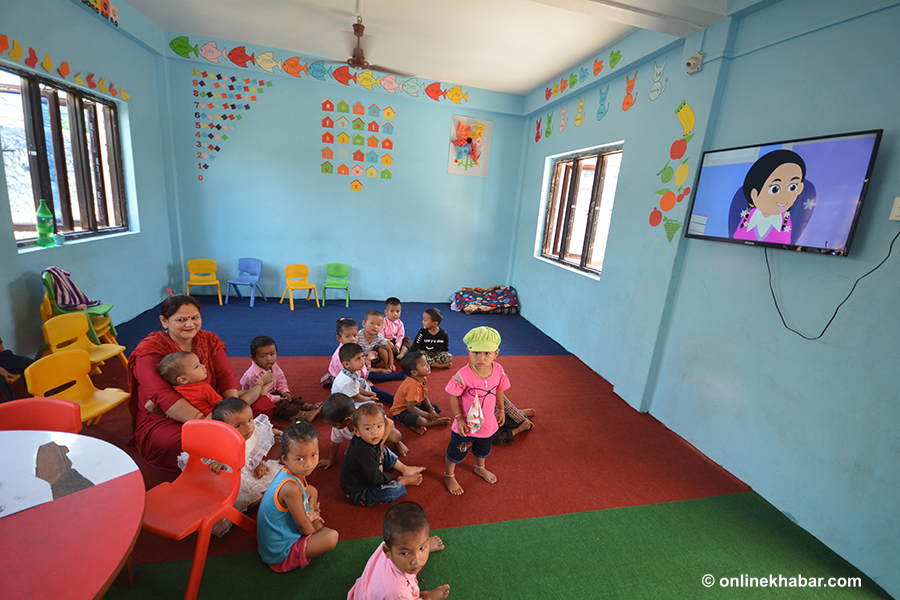Montessori learning, in principle, contributes to the intellectual, social and psychological development of children. Parents are increasingly attracted to Montessori schools because of their modern ways while teaching children and enabling them to learn according to their interests using playful materials.
Moreover, in the Montessori education system, children are taught through experimental methods. They do have to carry or read books. They are encouraged to learn through Montessori learning styles and other materials.
However, looking into Nepal’s context, most Montessori schools look quite away from the principle.
The deviation
In a Montessori school, in general, children are taught to use their five senses to learn. It is not just about the teaching process; it is also about getting them accustomed to school in future. Rather than through reading materials, the Montessori schools teach children by seeing, hearing, tasting, touching and smelling. But to do so, the children need time, which is why in many cases they are allowed to do whatever they want while learning.
“Although it takes time for children to learn by showing, touching, smelling, and playing with Montessori materials, the learning has a long-term effect on children’s minds as well as it teaches them to be social,” says Prof Susan Archarya.
However, she argues the Montessori kindergarten system of Nepal runs in a traditional way even though teachers are Montessori-trained, due to which children’s learning has not been fruitful as desired.
A Montessori school is a platform where children can learn a variety of life skills and behaviours through fun activities. Sports equipment should be within the reach of children and according to the Montessori system, they are allowed to play and use it anytime they want.
Kamala Dhakal Adhikari, the principal of Chhunamuna Preschool, admits the Montessori schools in Nepal have not been able to provide international standard Montessori education. “Nepal’s Montessori has not been able to make the learning of children as effective and productive as the Montessori abroad,” she says.
Educationist Bidya Nath Koirala complains most of the Montessori kindergartens in Nepal do not meet international standards and do not have a significant impact on the social, mental and intellectual development of children.
“The Montessori school aims to empower children by recognising their potential and educating them accordingly, ” he says, adding there is no quality and effectiveness of Montessori schools in Nepal.
Slow progress

Koirala says the main objective of Montessori education should be to instil confidence in children, develop positive thinking towards society and other people, identify the potential of children and try to encourage them to learn accordingly.
“In the current situation, parents should be aware of their children’s learning methods and change their traditional thinking. Also, children’s learning or Montessori education cannot be effective unless parents and teachers are aware,” adds Koirala.
Accordingly, Adhikari explains in recent times, some Montessori schools have followed international methods that have made children’s learning more effective and they are taught according to their interests and desires. Montessori methods and methodology is a technique of learning by playing. For this, it is important for the children to have a place to play and also have reading materials to read.
Adhikari says Montessori education has been started as an alternative to the traditional way of learning by carrying heavy loads of backpacks to school. She says Montessori schools teach children in an experimental way by making them test and experience themselves which help in sustainable and effective learning.
Koirala also agrees that teaching children through recreational activities helps them learn faster and when learning is effective, it will be easier for them to continue higher studies in the future.
What are Montessori schools anyway?
Montessori is an educational method developed and used by Italian citizen Maria Montessori. This method is now adopted all over the world. The Montessori method, which is considered to be very effective for children’s learning, is becoming very popular.
While Maria was working as an intern in the Department of Child Psychology at the University of Rome, she came in contact with mentally weak and disabled children who needed alternative ways to learn.
There, she had the opportunity to study and research child psychology. Later, she felt the need for a different kind of education system for children than the traditional one. Hence, she took in children from the squatter settlements and began studying them experimentally. She started teaching children natural methods. Later, she spread this natural method all over the world.
In 1907, she opened the Casa dei Bambini, or Children’s House, school. This is considered the first Montessori school in the world.
This story was translated from the original Nepali version and edited for clarity and length.




















